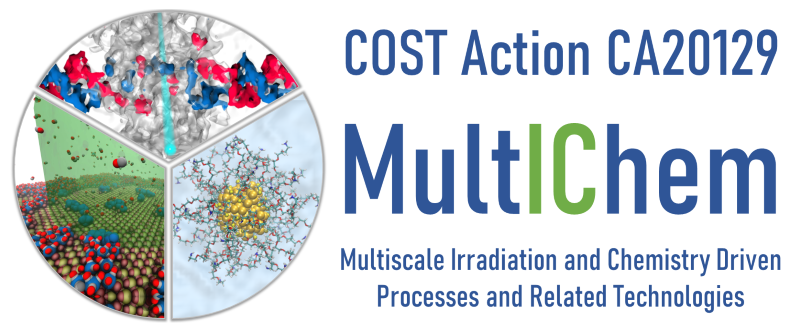L = Lectures; T = hands-on Tutorials
Monday, October 03
| 09:30 - 09:45 | Training School opening |
| 09:45 - 11:00 | Multiscale modeling of irradiation-driven processes and phenomena (L) |
| 11:00 - 11:30 | Coffee break |
| 11:30 - 12:45 | Basics of MBN Explorer and MBN Studio and areas of application (L) |
| 12:45 - 14:00 | Lunch |
| 14:00 - 15:30 | Getting started/Setting up the calculations with MBN Explorer (T) Specification of input files and formats Introduction to MBN Studio (T) Overview of main features of MBN Studio; trial case studies representing certain physical experiments and demonstrating capacities of the program |
| 15:30 - 16:00 | Coffee break |
| 16:00 - 18:00 | Gases, liquids, crystals (T) Description of setting up simulations of gaseous, liquid and crystalline media with MBN Explorer; different types of boundary conditions; energy, temperature and pressure control in MBN Explorer Atomic and molecular clusters, nanoparticles (T) Construction of clusters and nanoparticles with MBN Studio; description of setting up calculations involving atomic clusters and nanoparticles |
Tuesday, October 04
| 09:30 - 11:00 |
Biomolecular systems (T) Exploration of dynamical processes with biomolecular systems; use of the molecular mechanics potential for setting up calculations of biomolecular systems; simulation of bond breakage processes in biomolecular systems using MBN Explorer |
| 11:00 - 11:30 | Coffee break |
| 11:30 - 13:00 |
Irradiation induced transformations of biomolecular systems (T) Exploration of dynamical processes related to the irradiation induced thermo-mechanical damage of molecular and biomolecular systems |
| 13:00 - 14:30 | Lunch |
| 14:30 - 16:00 | Collision and irradiation induced processes (T) Molecular dynamics simulations of collision and irradiation-induced processes (fission, fusion, fragmentation) involving clusters, nanoparticles, as well as organic and inorganic molecular systems and materials |
| 16:00 - 16:30 | Coffee break |
| 16:30 - 18:00 |
Reactive and Irradiation-Driven Molecular Dynamics (T) Introduction to the key principles of reactive molecular dynamics (RMD) and irradiation-driven molecular dynamics (IDMD) and related case studies |
Wednesday, October 05
| 09:30 - 11:00 | Nanostructured materials (T) Atomistic modeling of metallic, organic & inorganic nanomaterials and thin films. MD simulations of nanoscale phase and structural transitions |
| 11:00 - 11:30 | Coffee break |
| 11:30 - 13:00 | Thermomechanical properties of materials (T) Investigation of thermomechanical properties of crystalline, nanostructured and amorphous materials by means of MD simulations |
| 13:00 - 14:30 | Lunch |
| 14:30 - 16:00 |
Composite materials and material interfaces (T) Atomistic modeling of alloys and composites. MD simulations of deposition, diffusion and aggregation processes |
| 16:00 - 16:30 | Coffee break |
| 16:30 - 18:00 |
Multiscale modeling using stochastic dynamics (T) Application of the stochastic dynamics method for simulations of fractal structures growth and their post-growth relaxation |
Thursday, October 06
| 09:30 - 11:00 | Collision physics: Electron collisions & Ion collisions (L) Understanding radiation damage of materials and radiotherapy requires an understanding of the interaction of different types of radiation with constituent atoms and molecules. Such collisions are defined by their cross section. In these lectures we will review basic collision processes and discuss the experimental methods by how collision cross sections are measured including the use of mass spectrometry. |
| 11:00 - 11:30 | Coffee break |
| 11:30 - 13:00 | Introduction to ion beam cancer therapy and related experiments (L) Ion beam Cancer Therapy (IBCT) has been highlighted as next generation radiotherapy technology. This session will review the principles, historical development, current status and current challenges of IBCT and describe several experiments that are directed towards understanding and developing IBCT. |
| 13:00 - 14:30 | Lunch |
| 14:30 - 16:00 |
Accelerator physics (L) Many radiotherapy techniques are based on the use of accelerators. This session will discuss accelerator design and operation with examples of their application in both the clinic for radiotherapy and in academic studies of materials. |
| 16:00 - 16:30 | Coffee break |
| 16:30 - 18:00 |
Working at the nanoscale (L) Building structures at the nanoscale and the use of nanoparticles in medicine is at the forefront of modern technology and allowing new clinical treatments. In this session we will discuss how such nanosized objects are synthesized, characterized and imaged. Relevant experiments techniques such as TEM, AFM, STM, etc., will be reviewed. |
Friday, October 07
| 09:30 - 11:00 | A question of phase (L) How do physical and chemical properties change as a function of phase? What are the experimental techniques used to study molecules in liquid and solid (condensed) phase? |
| 11:00 - 11:30 | Coffee break |
| 11:30 - 13:00 | Clusters – bridging the complexity gap (L) The study of molecular clusters provides a method of exploring how physical and chemical properties change from gaseous to solid phase. Recent experiments on clusters and their insight into radiation processes will be discussed. |
| 13:00 - 14:30 | Lunch |
| 14:30 - 16:00 |
Quantifying DNA damage (L) How do we measure damage to DNA and why is it important in assessing the dose that can be applied under clinical conditions? In this session we will discuss the methods used to observe and quantify radiation damage to DNA. |
| 16:00 - 16:15 | Training School Closing |
